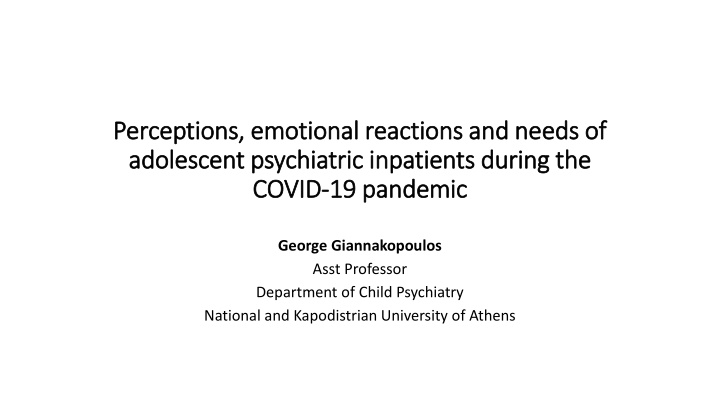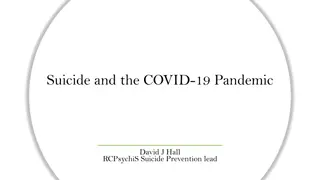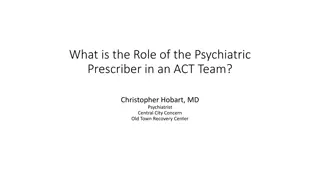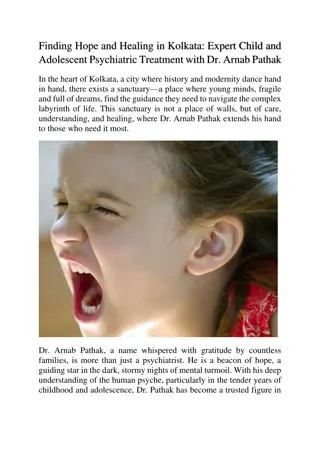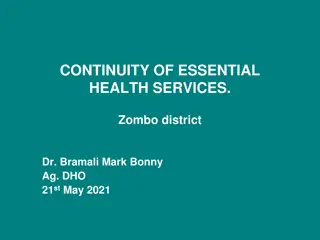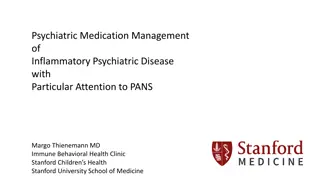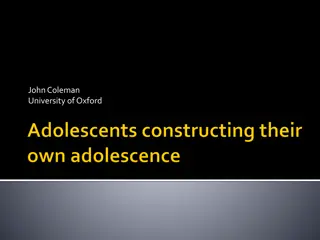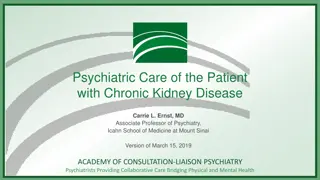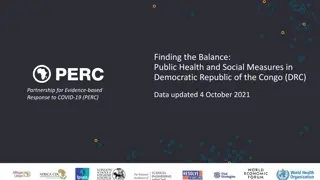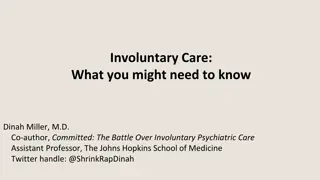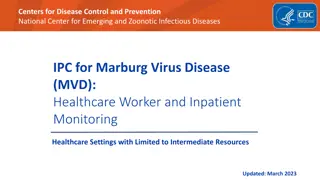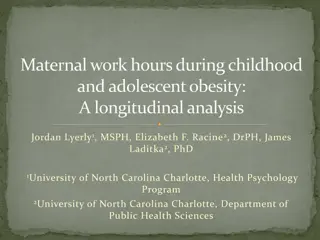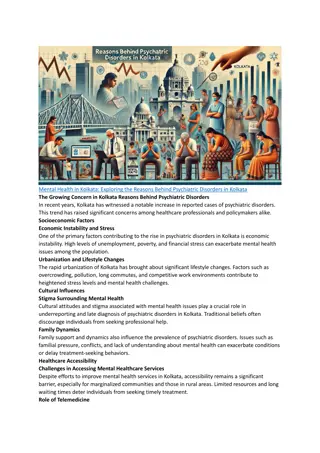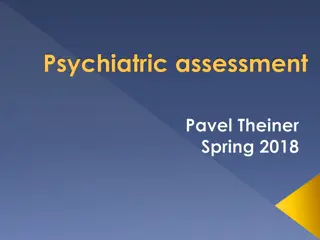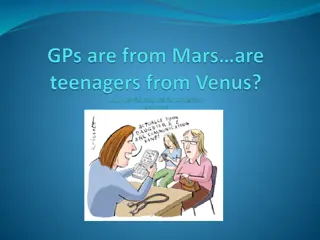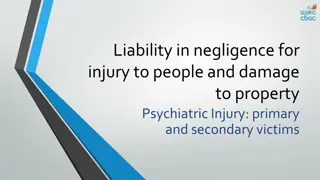Perceptions and Needs of Adolescent Psychiatric Inpatients During COVID-19 Pandemic
This study explores the perceptions, emotional reactions, and needs of adolescent psychiatric inpatients amidst the COVID-19 pandemic. Through individual interviews, themes such as knowledge about the pandemic, changes in routine, feelings, positive behaviors, and social support were examined. Participants shared insights on combating the virus, revealing concerns and hopes regarding its impact on different age groups.
Download Presentation

Please find below an Image/Link to download the presentation.
The content on the website is provided AS IS for your information and personal use only. It may not be sold, licensed, or shared on other websites without obtaining consent from the author.If you encounter any issues during the download, it is possible that the publisher has removed the file from their server.
You are allowed to download the files provided on this website for personal or commercial use, subject to the condition that they are used lawfully. All files are the property of their respective owners.
The content on the website is provided AS IS for your information and personal use only. It may not be sold, licensed, or shared on other websites without obtaining consent from the author.
E N D
Presentation Transcript
Perceptions, emotional reactions and needs of Perceptions, emotional reactions and needs of adolescent psychiatric inpatients during the adolescent psychiatric inpatients during the COVID COVID- -19 pandemic 19 pandemic George Giannakopoulos Asst Professor Department of Child Psychiatry National and Kapodistrian University of Athens
Background The new coronavirus pandemic has been accompanied by severe psychological pressure Little is known about how this pandemic could affect the population with severe mental illness
Aims To explore adolescent psychiatric inpatients perceptions, emotional reactions and needs during the first wave of the COVID-19 pandemic
Methods Individual in-depth interviews were conducted with nine psychiatric inpatients aged 12 17 years Through open-ended questions, interviewers initiated five themes: knowledge about coronavirus pandemic changes in everyday routine feelings positive thoughts and behaviors how the social environment can help adolescents deal with the situation A thematic analysis was conducted using line-by-line open coding
Knowledge about the coronavirus pandemic Information about the nature of the coronavirus many people have died from all this the older ones can easily die (Participant 1) others go through it a little heavily, others more lightly I know that mostly older people get sick children fortunately go through it very lightly because, unfortunately, it is very easily transmitted by children to adults mainly (Participant 8)
Knowledge about the coronavirus pandemic Combating coronavirus pandemic In Greece we have handled it quite well, so things are better than in other countries that have been hit harder than us (Participant 1) unfortunately, it has not yet been found, at least to the best of my knowledge, either a drug or a vaccine or anything else we hope to find a vaccine (Participant 2)
Knowledge about the coronavirus pandemic Psychosocial aftermath The (infected) are afraid of the pandemic and feel anxiety, isolation ... they can't see their loved ones ... even their friends, their relatives... Very sad indeed (Participant 9)
Changes in everyday life Positive changes ... unless we consider the general condition worldwide, the strict measures that each country has taken... I understand these measures that have been taken and I believe all this is happening for our own good, so I comply with them like any other citizen and I believe that all this will pass, and we will continue our daily routine as before...(Participant 2) ... so, we are all together again... it s been a long time since we d all been together like that... it was an opportunity to spend some time together... (Participant 1)
Changes in everyday life Negative changes .. I cannot meet my loved ones in person... (Participant 1) ... there can sometimes be disagreements or fights about many issues... (Participant 1) ... obviously I can't go out whenever I want to (Participant 1) we can only go out when... for some important reason... and still one person at a time...(Participant 2) ... we must send a text message if we need to go out... (Participant 6) We must be within distance from each other, we don't hug each other too much (Participant 3)
Feelings about the pandemic Negative feelings 1 I feel a bit anxious because my mum unfortunately belongs to a vulnerable group ...and I want to know that she is well, all the time... I am very concerned about my grandparents who are old... about the people whom I love, and I care about (Participant 8) I see my brother, who is a student and obviously used to go out very often, being more irritable and getting mad more easily... (Participant 1) ... but ok, I can t say I am really worried about contracting it myself... (Participant 1)
Feelings about the pandemic Negative feelings 2 I m worried about how things will evolve I mean, how am I to go to school next year ... what will happen with the exams ... all this stresses me out ... I like to know my schedule and not be, like, in a "wait- and-see" situation... (Participant 1) I feel anxiety about when this thing will come to an end (Participant 6) In other countries, cases are either increased daily or are way too many... (Participant 2)
Feelings about the pandemic Negative feelings 3 I m sad about all these people who have died, or those who are ill, and we still don t know their outcome (Participant 2) I also feel very bad about the other people who used to be free before but now are all homebound... (Participant 8) I feel a bit sad for not being able to see my dad, because - as a high-risk individual - he is not allowed to get around... (Participant 3) I also feel sorrow that I do not see my family... (Participant 9) I feel sadder because I m mainly bored... (Participant 6) ... I simultaneously feel anger... and maybe sadness... (Participant 9)
Feelings about the pandemic Negative feelings 4 I don t feel very well ... but I manage. Everybody must be feeling like that, like they are boxed in a house (Participant 5) ... It would help me to be out, not in here... to be with my brothers, my family, with the ones I love. ... I cannot do the things I want when I m shut in here, and I feel like being on my own. (Participant 7)
Feelings about the pandemic Positive feelings This will not be for too long, now that the temperature is rising and it ll be warm, it will goaway (Participant 3) ...on the other hand, I m happy to hear on the news that cases are decreasing daily, at least in Greece... I believe everything will be fine... (Participant 2) I enjoy the days spent with my parents, because I know that when we go back to normality my mum will be working work until late, my dad will return to his shifts and all that... so it was a chance for all of us to be together (Participant 1)
Helpful thoughts avoidance of ruminating about the pandemic focusing on the positive aspects focusing on what the future brings feeling that they are not alone
Helpful thoughts Trust in the authorities and in the community and I think that Greece has taken preventive measures much earlier, compared to other countries, and [I think] that, at present, we are one of the safest countries (Participant 6) there haven t been many violations (Participant 1) ... we have taken precautions ... and that reassures me... (Participant 6) ... both doctors and experts do the best they can to help people feel safe... (Participant 2)
Helpful behaviors I generally don't sit and watch the news all the time this doesn t help me obviously I watch very little, just enough so as not to live in a bubble (Participant 1) Obviously, talking to my friends and not isolating myself helps; the same goes for talking with my grandparents via Skype as much as I can .... and, when I'm feeling anxious, I visit my parents for support ... I believe in this... (Participant 1)
How the social environment can help Balanced health messaging Obviously [I want the family] to not hide things from me, to not tell me everything is fine , because, ok, I wouldn t like to not know what is going on... but I wouldn t like to hear them overanalyzing all this with aimless discussions either (Participant 1)
How the social environment can help Balanced approach and mindset if a family s or the relatives, or the wider environment s general perception is positive and correct, then the child does not worry that much and feels relief instead (Participant 2) Just others to not feel sad and not give up (Participant 5) To not exaggerate... to not act as if this is the end of the world (Participant 1)
How the social environment can help Emotion regulation within the environment ... that tensions will be not... and others will not be stressed, because stress is transmittable, so when my parents feel anxious, I can sense it too (Participant 1) ... that I could talk to my parents or my sister about the problems that worry me (Participant 9) ... and they would tell me things like this will go away soon , it will not last too long, and then things will be like they used to be (Participant 3)
How the social environment can help Family s positive emotional climate When, for example, my relatives discuss with me, this helps me a lot (Participant 6) ... and when, to a great extent, they understand how we feel (Participant 2) What I need now, I believe, is for my family to stand by me... because I don t feel alone in that way (Participant 1) It would help me very much, if the hospital staff could pressurise the institution staff to come and get me... as soon as possible... and then, if they could bring my brothers here to see them for a bit, but they can t actually consider where they live... (Participant 7)
How the social environment can help Shared leisure time and distractions ... to spend our time creatively, to not have many moments that I would sit and think on my own about what will happen... so, when others are by me and draw my attention away from all this coronavirus issue, I believe this helps me a lot (Participant 1) ... when I discuss together with the people with whom I share the same space, this helps take our minds off all this (Participant 6)
How the social environment can help Looking into the future ... it helps for others to tell me several things we can do and arrange when the pandemic ends, for example, discussing where we can go out, or where to spend the summer holidays (Participant 6)
How the social environment can help Compliance Maybe if all people would isolate themselves in their home, this would be helpful for me, because there are people who don t abide by the measures and go out and unfortunately that s how the virus is being transmitted (Participant 8)
Conclusion Providing both standard and emergency mental health care Adopting a more individualized orientation Making the most of the technological provisions Exhibiting flexibility and creativity to facilitate continuity of mental health care
Giannakopoulos G, Mylona S, Zisimopoulou A, Belivanaki M, Charitaki S, Kolaitis G. Perceptions, emotional reactions and needs of adolescent psychiatric inpatients during the COVID-19 pandemic: a qualitative analysis on in-depth interviews. BMC Psychiatry. 2021;21:379
